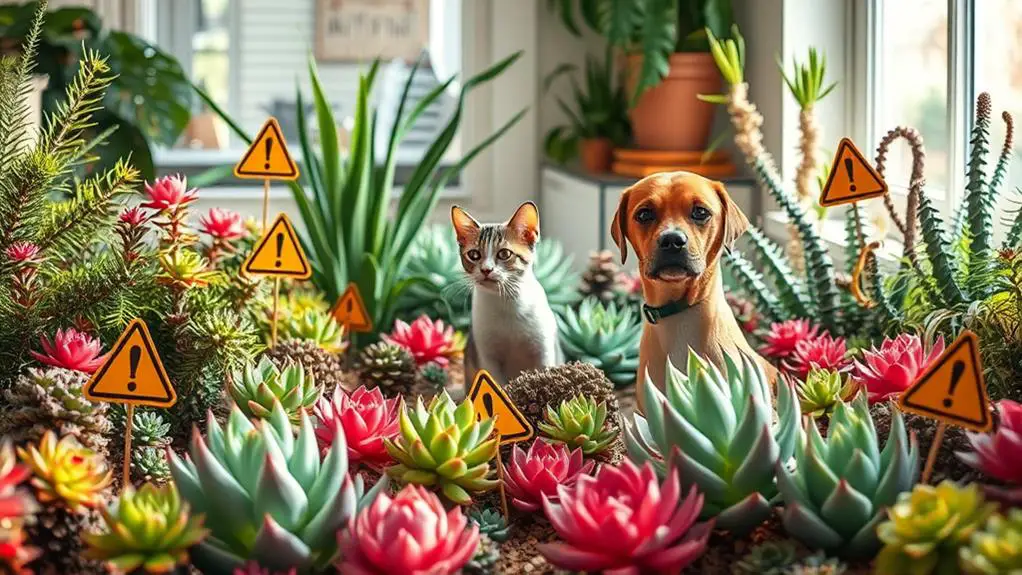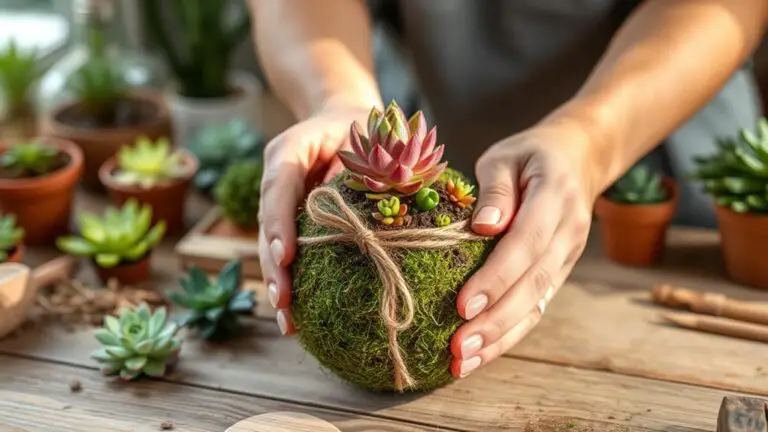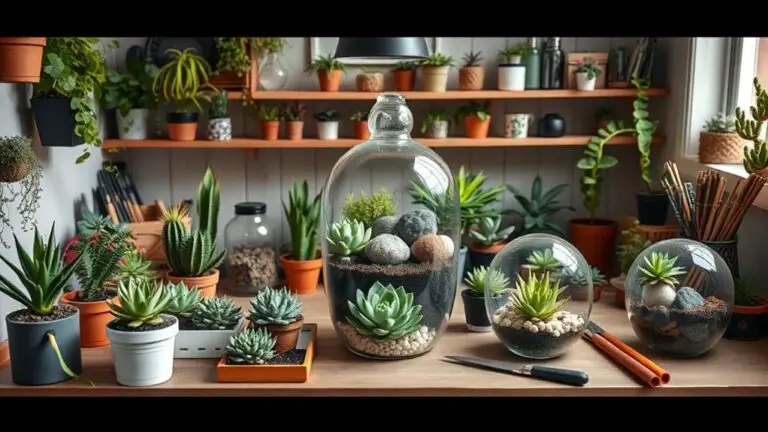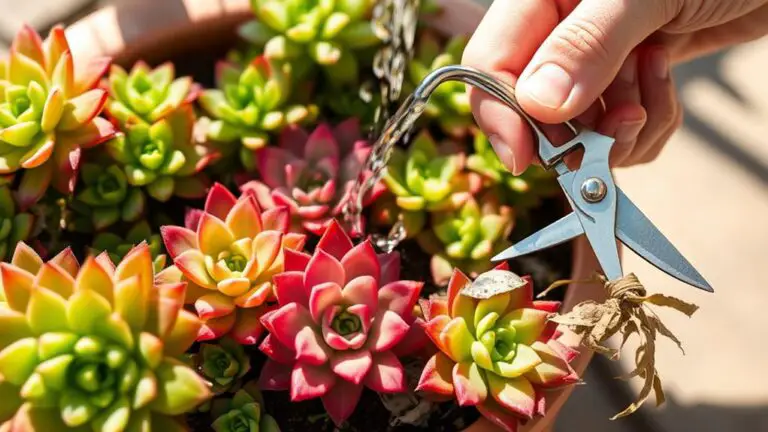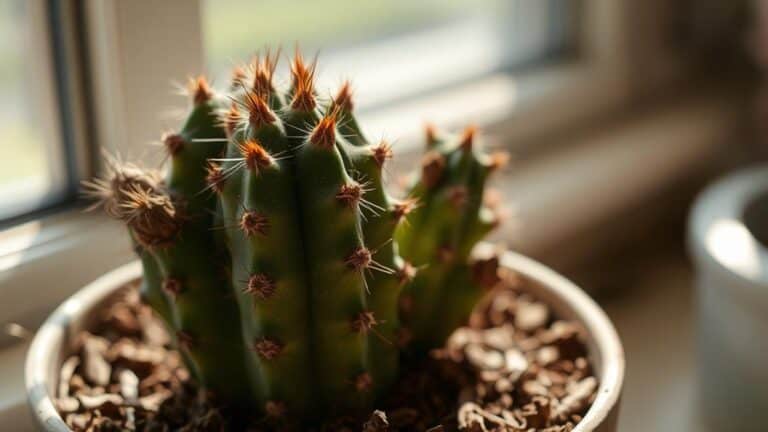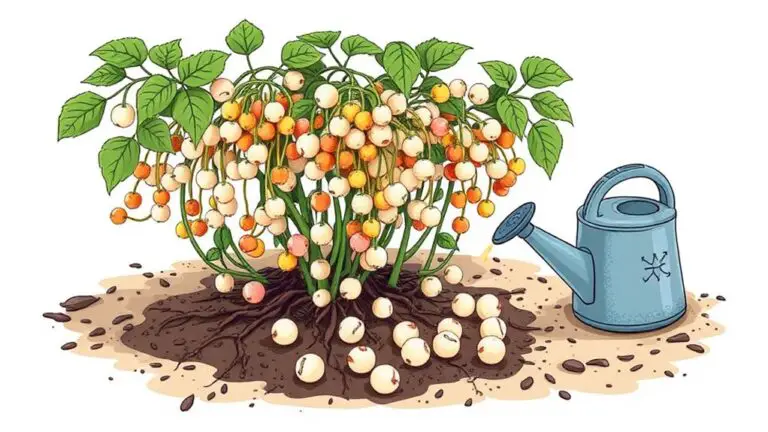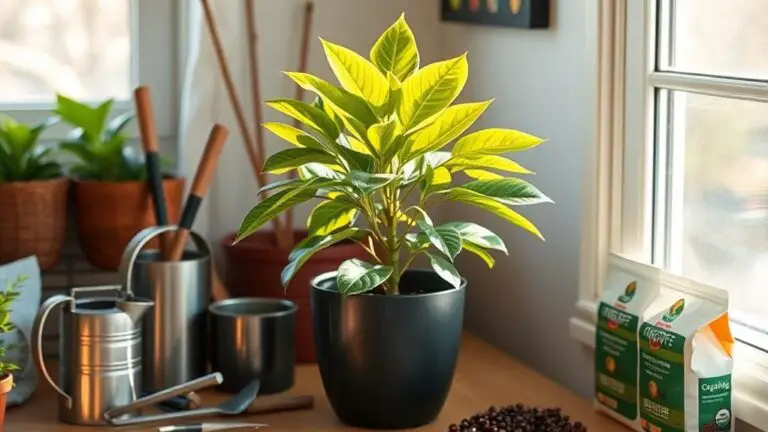5 Succulent Plants Toxic for Pets
When you think about adding some greenery to your home, you probably don't consider how some plants might pose a risk to your pets. Among the popular choices, certain succulent plants like Aloe Vera, Kalanchoe, Euphorbia, Jade Plant, and String of Pearls hide potential dangers. You might be surprised to learn that these attractive plants can cause anything from mild irritation to severe health issues in your furry friends. Curious about which one of these common succulents could be lurking as a silent threat in your household? Let's uncover the details and guarantee your pets' safety.
Aloe Vera
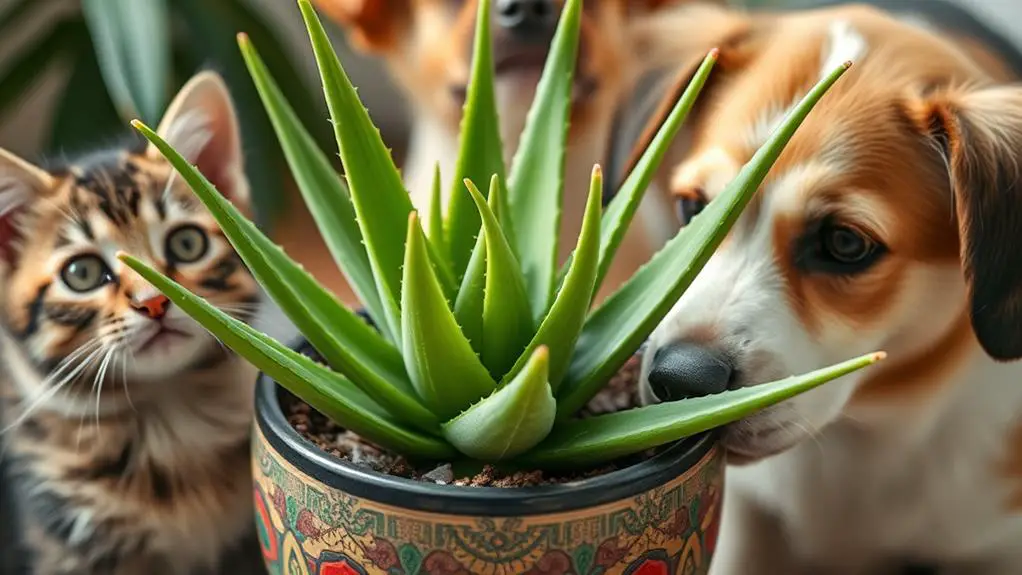
Despite its popularity for human medicinal uses, Aloe vera is harmful to pets due to its aloin content, a toxic bitter liquid found under the plant's skin. If your dog or cat ingests Aloe vera, it can cause severe gastrointestinal distress. Symptoms include vomiting, diarrhea, lethargy, and in extreme cases, red urine.
It's vital for pet owners to understand that all varieties of Aloe vera are toxic to cats and dogs. Aloe vera, like many succulents, might seem like a harmless addition to your home, but its ingestion can be dangerous for your furry friends.
If you suspect your pet has ingested Aloe vera, seek veterinary care immediately. Quick action can make a big difference in your pet's health.
You can find more details about Aloe vera toxicity from reliable sources, such as the ASPCA and UC Davis Veterinary Medicine. These resources provide valuable information to help you keep your pets safe.
Kalanchoe
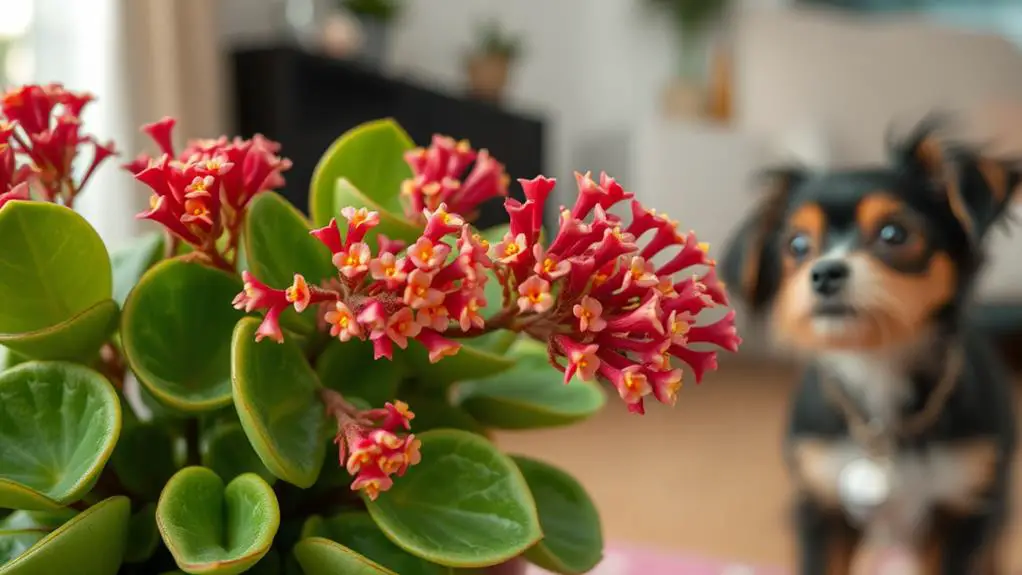
Kalanchoe, often called "mother of millions," poses a significant risk to pets due to its toxic properties. If you have cats and dogs, it's vital to know that Kalanchoe can cause serious health issues if ingested.
The primary symptoms of Kalanchoe poisoning include vomiting and diarrhea due to gastrointestinal irritation. These symptoms may appear anywhere from 12 hours to five days after your pet has consumed the plant.
The toxic compounds in Kalanchoe are known as cardiac glycosides. These chemicals can lead to severe heart arrhythmias, which can be life-threatening.
As a pet owner, you should avoid keeping Kalanchoe indoors or in areas where your pets can easily access it. If you suspect your pet has eaten any part of the Kalanchoe plant, immediate veterinary assistance is vital to prevent serious complications.
Pay close attention to symptoms such as vomiting, diarrhea, or changes in heart rhythm. Quick action can make a significant difference in your pet's recovery.
Always consult your vet if you have any concerns. Keeping your pets safe involves being aware of the dangers and taking steps to eliminate risks.
Euphorbia
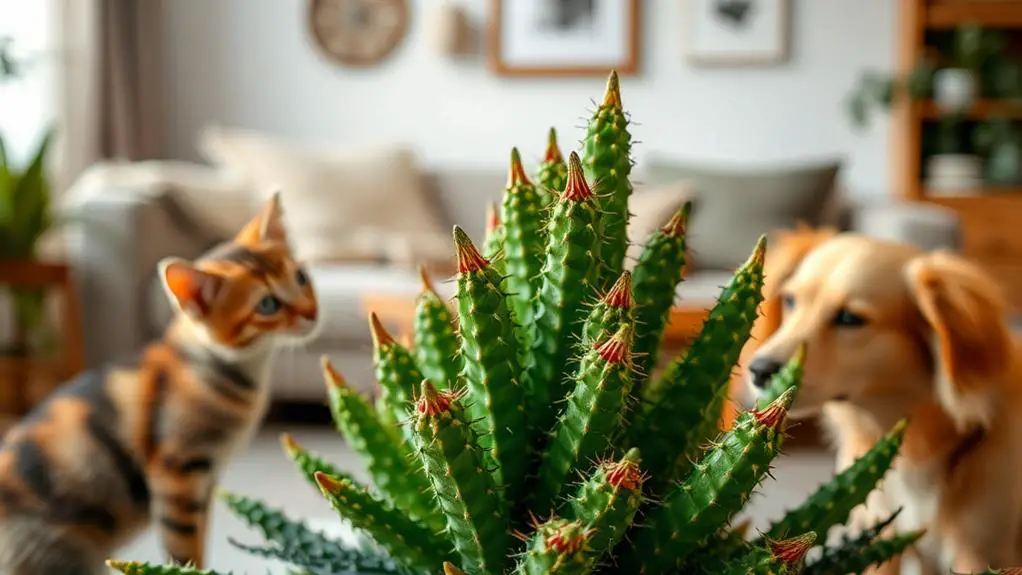
Euphorbia species, known as Milk Plants, are hazardous to pets due to their toxic white latex sap. This sap can cause severe skin irritation and affect the mucous membranes of your pets upon contact.
If your dog or cat ingests any part of these succulents, they might suffer from gastrointestinal upset, including symptoms like vomiting, diarrhea, and stomach pain.
Common varieties of Euphorbia, such as Pencil Cactus and Crown of Thorns, pose significant risks to your pet's safety. The toxicity in these plants is due to compounds like diterpenes and saponins.
These chemicals can cause adverse reactions not just in pets, but in humans too, if the sap touches your skin or is ingested.
To keep your pets safe, it's essential to place all Euphorbia plants out of their reach.
If you suspect your pet has come into contact with or ingested any part of a Euphorbia plant, seek veterinary assistance immediately. Quick action can prevent more severe health issues and guarantee your pet gets the care they need.
Being informed and cautious can help you enjoy gardening while keeping your furry friends safe.
Jade Plant
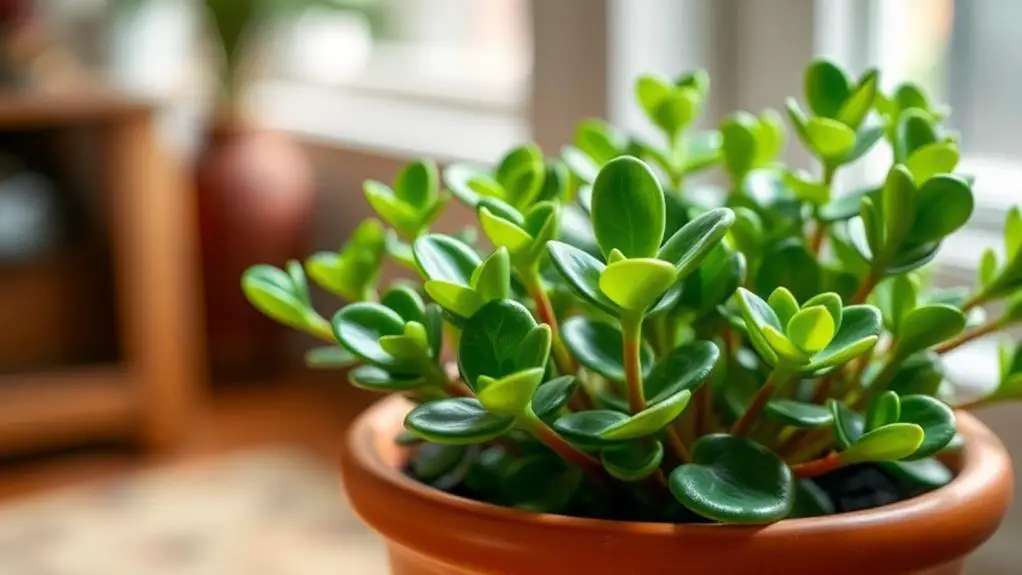
Moving from the potential dangers posed by Euphorbia species, we now turn our attention to the Jade Plant. The Jade Plant, scientifically known as Crassula argentea, is a popular succulent often found in homes. However, if your pets ingest any part of this plant, they may suffer from vomiting, lethargy, and incoordination. These symptoms can make your pet's movements appear clumsy, and they might even dry-heave or experience gastrointestinal upset.
To help you understand better, here's a quick look at the symptoms and actions to take:
| Symptom | Description | Action |
|---|---|---|
| Vomiting | Frequent dry-heaving or actual vomit | Seek veterinary guidance |
| Lethargy | Unusual tiredness or sluggishness | Monitor and keep them comfortable |
| Incoordination | Clumsy movements, stumbling | Prevent further ingestion, call vet |
Though Jade Plants are less toxic compared to some other plants, ingestion can still pose significant health risks to your pets. It's vital to keep these succulents out of reach of curious pets to prevent accidental ingestion. If your pet shows any signs of distress after consuming Jade Plant leaves, seeking prompt veterinary guidance is imperative. Quick action can help mitigate more serious health effects and guarantee your pet's well-being.
String of Pearls
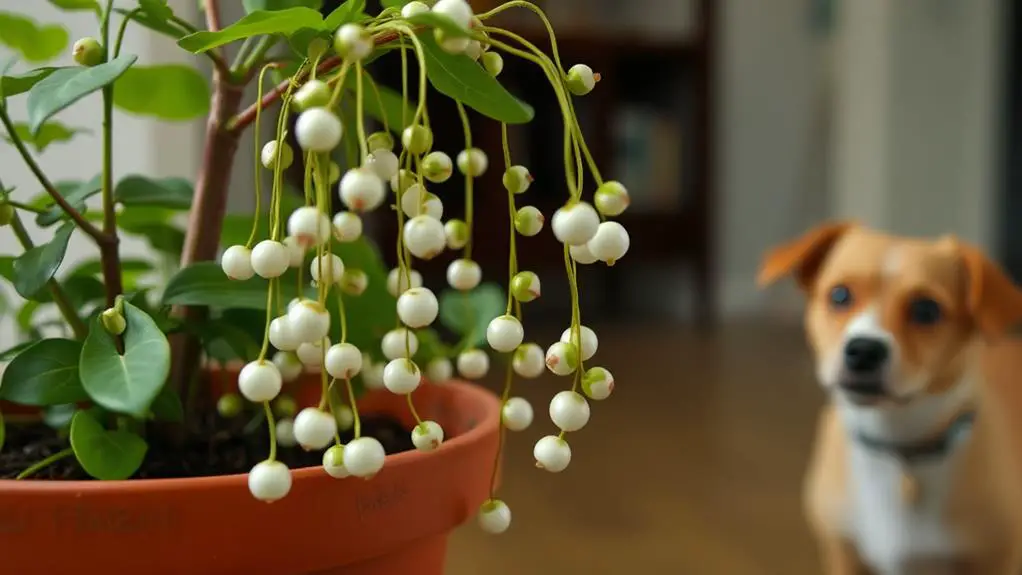
String of Pearls, scientifically known as Senecio rowleyanus, is a trailing succulent that stands out with its bead-like leaves resembling pearls on a string. This plant is quite popular among succulent enthusiasts due to its unique appearance.
However, if you have pets, especially cats, it's crucial to be cautious. String of Pearls contains a white sap that can irritate skin and cause upset stomachs if ingested by your furry friends.
Cats and dogs might be tempted to play with or chew on this plant because of its dangling leaves. Ingestion can lead to symptoms like lethargy and vomiting. These symptoms mean your pet isn't feeling well and needs help.
Consequently, it's important to monitor pets around this plant and keep it out of their reach to guarantee they stay safe.
If you notice any signs of irritation or an upset stomach in your pet, contact your vet immediately. While String of Pearls is one of the many common succulents around, it's not safe for pets.
Frequently Asked Questions
Are Any Succulents Toxic to Pets?
Yes, some succulents are toxic to pets. Aloe vera, Kalanchoe, Euphorbia, Jade plants, and Fiddle Leaf can cause symptoms like vomiting, diarrhea, and lethargy if ingested. Keep these plants out of your pets' reach.
What to Do if My Dog Ate a Succulent?
If your dog ate a succulent, watch for symptoms like vomiting or lethargy. Contact your vet immediately, provide details about the plant, and bring a sample or photo. Quick action and accurate information can be vital for your dog's recovery.
What Happens if My Cat Eats a Succulent Leaf?
If your cat eats a succulent leaf, it might show symptoms like vomiting, diarrhea, or lethargy. Some plants can cause severe issues like heart arrhythmias. Monitor your cat closely and contact a vet immediately for advice.
Are There Any Poisonous Succulents?
Yes, some succulents are poisonous to pets. Aloe vera, Kalanchoe, Euphorbia, Jade Plant, and Snake Plant can cause serious health issues if ingested. Always research plant safety before introducing new succulents into your home.
Conclusion
It's important to know which succulents are toxic to pets so you can keep them safe. Aloe Vera, Kalanchoe, Euphorbia, Jade Plant, and String of Pearls all pose risks. But don't worry! With a bit of care and awareness, you can still enjoy a beautiful garden. Choose pet-friendly plants and place toxic ones out of reach. Your pets' health and your love for gardening can go hand in hand. Happy planting!

